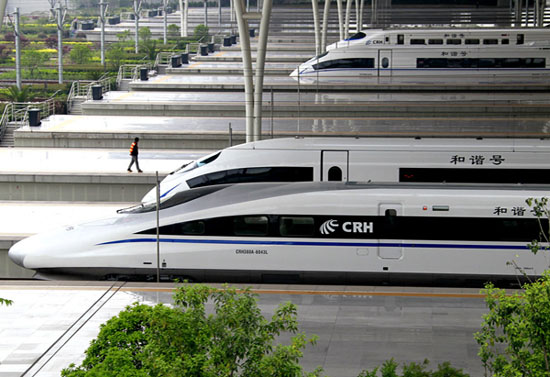Bullet trains offer alternative and challenge to airlines
|
|
|
China Railway High-speed (CRH) trains are seen stopping at Shanghai Hongqiao Railway Station in Shanghai, east China, May 11, 2011. China launched the test run for the high-speed railway between Shanghai and Beijing here on Wednesdy. [Photo/Xinhua] |
The trial operation of the high-speed railway linking Shanghai and Beijing is ramping up the competition between bullet trains and airlines, with the latter confronting the threat its passenger numbers will tumble on their most profitable domestic routes.
More than 60 percent of the civil aviation market may be affected by the advent of high-speed rail in China.
A month-long trial of the Shanghai-Beijing high-speed railway started on May 11. The new service is expected to be fully operational by the end of June.The fastest journey along the 1,318-kilometer route from Shanghai's Hongqiao Railway Station to Beijing South Railway Station took four hours and 48 minutes, with trains traveling at speeds of up to 300 kilometers an hour.
The flight from Shanghai to Beijing takes only two hours, but the time doesn't include airport check-in lines, security procedures, plane delays, bad weather or possible other hiccups. Adding all these it can take up to five hours to make the trip by air.
Luo Zhuping, board secretary of China Eastern Airlines, said he isn't too worried about high-speed train competition. Businessmen are the carrier's main passengers on the Shanghai-Beijing route, he said, and they care more about travel experience than ticket price.
"I would still choose to go by plane on business trips, not only because of it's faster but also because I can get the fare reimbursed and I collect frequent-flier credits," said Joshua Xu, who works as a foreign consultant in Shanghai.
"However, I would consider taking bullet trains for leisure trips if the fares are lower than air tickets," he added.
Discussions are still going on for ticket prices for high-speed train services. Rail authorities insist that fares will be "comparable" to those charged by airlines.
To prepare for the competition, airlines offer various discounts on airfares. The standard price of a single air ticket between Shanghai and Beijing is 1,290 yuan (US$199). There's speculation that the fare for the bullet train will be half that.
"Passenger demand is high between Shanghai and Beijing and demand is still growing, so the two transport systems don't need to worry too much about load factors," said Xie Li, a professor at the Civil Aviation Management Institute of China. "But airlines need to improve punctuality and in-flight services to retain high-end passengers and core competitiveness."
It's not just the lucrative Shanghai-Beijing route that's fanning competition in transport. That route represents only about 10 percent of the country's grand design for high-speed rail. By 2012, China's high-speed rail network is forecast to expand to 13,000 kilometers.
The Ministry of Railways has announced that 745.5 billion yuan will be spent on high-speed rail this year.
The fast expansion of bullet trains has already had repercussions for air travel. China Southern Airlines and Lucky Air recently stopped flying between Wuhan and Nanjing after bullet trains started linking the cities.
Some airlines have curtailed or halted services on routes between Wuhan and Nanchang, Shanghai and Zhengzhou, Xi'an and Zhengzhou, Wuhan and Yichang, Wuhan and Xiangyang, and Chengdu and Chongqing because of rail competition.
About 66 percent of respondents in a survey of 1,030 people conducted by Sina.com said they would prefer to take high-speed trains rather than airplanes.
Nearly half of the respondents agreed that the expansion of high-speed railways would adversely affect the civil aviation industry.
"Competition would be healthy because airlines will be cornered and have to improve services and reduce ticket prices," one respondent said in the survey.
 0
0 








Go to Forum >>0 Comments